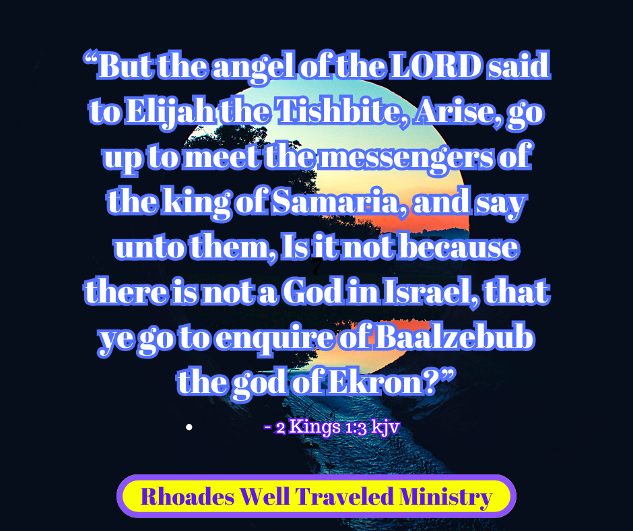GOD'S WORD
▬ The 2nd Book of the Kings Commonly Called the 4th Book of the Kings Ch 1 and 2 ▬
January 13, 2024

Reverend Danny Rhoades
Good day Brothers and Sisters.
In today’s devotional, we will explore the 2nd Book of Kings, also known as the 4th Book of Kings in some religious traditions, is an important part of the biblical narrative. This book continues the historical account of the Israelite monarchy, chronicling the reigns of various kings and the prophetic ministries of notable figures such as Elijah and Elisha. Chapters 1 and 2 of this book specifically provide significant events and transitions in the prophetic narrative. This devotional, aims to explore and analyze these chapters, offering insights into the encounter between King Ahaziah and Elijah, as well as the ascension of Elijah and the subsequent appointment of Elisha as his successor.
Additionally, it will delve into the broader themes, historical context, and lessons portrayed in this section of the 2nd Book of Kings. Through this exploration, we gain a deeper understanding of the spiritual and political dynamics during this period of ancient Israel's history.
The 2nd Book of Kings, also commonly referred to as the 4th Book of Kings, is a fascinating continuation of the historical accounts of the kings of Israel and Judah. It begins where the 1st Book of Kings left off, chronicling the reigns of various kings and the prophetic activities of important figures like Elijah and Elisha. The book is filled with tales of political intrigue, power struggles, and divine intervention, providing insights into the spiritual and political landscape of ancient Israel.
While the exact author of the 2nd Book of Kings is unknown, it is commonly attributed to Jeremiah or one of his followers. The book was likely written during the Babylonian exile, between the 6th and 5th centuries BCE. The author compiled various sources, including royal records, prophetic writings, and oral traditions, to create a cohesive narrative that gives readers a glimpse into the history and religious beliefs of the Israelite people during this tumultuous period.
King Ahaziah of Israel was the son of Ahab and Jezebel, infamous figures who promoted the worship of the pagan deity Baal in Israel. Ahaziah followed in his parents' footsteps and continued to endorse this foreign religion, much to the dismay of the Israelite prophets.
During his reign, Ahaziah fell seriously ill after sustaining an injury from a fall. Instead of seeking guidance from the God of Israel, he sent messengers to consult Baal-Zebub, the god of the Philistine city of Ekron. This act of seeking help from a foreign deity angered the prophet, Elijah.
Elijah intercepted the messengers and confronted them about their lack of faith in the God of Israel. He prophesied that Ahaziah's injuries were severe and that he would not recover. The messengers returned to the king with Elijah's message, and Ahaziah ultimately died, fulfilling the prophecy.
After the events surrounding Ahaziah's death, Elijah embarked on a journey to the Jordan River. Elisha, his faithful servant, accompanied him, knowing that Elijah's departure was imminent.
At the Jordan River, Elijah performed a miraculous act by parting the waters, allowing him and Elisha to cross on dry ground. Knowing that his time had come, Elijah asked Elisha if there was anything he desired before his departure. Elisha requested a double portion of Elijah's spirit, signifying his desire to continue the prophetic work and receive the same level of divine empowerment.
As Elijah was taken up to heaven in a whirlwind, Elisha witnessed this amazing event and received a sign of confirmation: Elijah's cloak fell from the sky and landed on Elisha. This symbolized the passing of the prophetic mantle from Elijah to his chosen successor, Elisha. With this divine endorsement, Elisha assumed his role as the prominent prophet in Israel.
Before his departure, Elijah pronounced a prophetic declaration that Ahaziah would die from his injuries. This prophecy came to pass, illustrating the power and accuracy of God's word through Elijah.
After his ascent to heaven, some young men mocked Elisha, calling him "baldhead." In response, Elisha cursed them, and two female bears came out of the nearby woods and mauled forty-two of the young men. This event showcased the seriousness of disrespecting a prophet and further affirmed Elisha's authority.
Although Elijah's physical presence was no longer with the people, his influence extended beyond his departure. He played a crucial role in the anointing of Hazael as king over Aram and Jehu as king over Israel. These anointings were part of God's plan to bring judgment upon the wicked and disobedient rulers of the neighboring nations.
In conclusion, the 2nd Book of Kings, also known as the 4th Book of Kings, offers an intriguing account of the reigns of the kings of Israel and Judah, along with the prophetic activities of Elijah and Elisha. It delves into the political and spiritual dynamics of ancient Israel, providing valuable insights into the history and religious beliefs of the time. From the encounters between kings and prophets to the miraculous acts performed, this book showcases the divine intervention and the profound impact of the prophets on the destiny of the nation.
Elijah, the fiery prophet, was a force to be reckoned with. But when it was time for him to pass on the mantle, a successor had to step up. Enter Elisha, a humble man with a heart full of determination. In the opening chapters of the 2nd Book of Kings, we witness the transition from Elijah to Elisha and the start of a new era.
The people of Jericho were in quite a pickle. Their water supply was contaminated, rendering it undrinkable and causing infertility in their land. But Elisha, with a touch of his hand and a prayer to the Almighty, turned the situation around. The waters were healed, providing a clear message that God's blessings were upon Elisha and the people who followed him.
Being a prophet isn't all miracles and rainbows. Sometimes, there are challenges to face and detractors to deal with. Elisha experienced this firsthand when a group of disrespectful youths mocked him, taunting him about his bald head. Instead of letting it slide, Elisha called upon the divine power and two ferocious bears emerged from the woods, showing those youngsters not to mess with a prophet!
As Elisha stepped into his role as the heir of Elijah, he didn't disappoint. From multiplying oil for a widow to raising a child from the dead, Elisha continued to demonstrate the power of God at work through his ministry. Alongside these miracles, he also provided wise teachings and guidance to those around him, shedding light on the ways of God and the importance of faith.
The 2nd Book of Kings is brimming with valuable themes and lessons that still resonate with us today.
Through the lives of Elijah and Elisha, we witness the incredible power of God working through His chosen prophets. Miracles unfold, hearts are changed, and divine intervention takes place. This reminds us that even in our own lives, God's power and guidance are available if we seek Him with faith and openness.
The 2nd Book of Kings serves as a cautionary tale about the dangers of idolatry and disobedience. The Israelites' wanderings away from God led to devastating consequences, including the fall of their kingdom. It's a reminder for us to stay faithful and obedient to God's commands, lest we find ourselves caught in the web of our own wrongdoing.
Both Elijah and Elisha exemplify unwavering faithfulness and commitment to their divine callings. They faced trials, persecution, and doubts, yet they remained steadfast in their devotion to God. Their stories inspire us to stay true to our own callings, even when the path seems difficult or uncertain.
The 2nd Book of Kings holds historical significance as it chronicles the reigns of multiple kings of Israel and Judah. It provides a window into the political, religious, and social climate of the time, offering valuable insights into the challenges faced by the people and their leaders.
Additionally, the book underscores the importance of staying connected to God and His guidance, especially in times of political upheaval and moral decay. It serves as a reminder that even in the midst of chaos, God's sovereignty reigns supreme, and His promises endure for those who remain faithful to Him.
Brothers and Sister, now let us review what I just talked about.
First, what is the significance of the 2nd Book of Kings in the Bible?
The 2nd Book of Kings holds great significance in the Bible as it continues the historical account of the Israelite monarchy and focuses on the reigns of various kings, as well as the prophetic ministries of figures like Elijah and Elisha. It provides valuable insights into the spiritual, political, and historical dynamics of ancient Israel during that time.
Second, why are Chapters 1 and 2 of the 2nd Book of Kings important?
Chapters 1 and 2 of the 2nd Book of Kings are important as they capture pivotal moments in the prophetic narrative. They depict the encounter between King Ahaziah and Elijah, highlighting the consequences of disobedience and the power of God's prophets. Moreover, these chapters mark the ascension of Elijah and the subsequent appointment of Elisha as his successor, which sets the stage for Elisha's miraculous ministry.
Third, What lessons can be learned from the 2nd Book of Kings, Chapters 1 and 2?
Through Chapters 1 and 2 of the 2nd Book of Kings, we can learn several valuable lessons. These include the importance of faithfulness to God's call, the consequences of idolatry and disobedience, and the power of divine intervention through God's prophets. The narratives within these chapters offer insights into the complexities of human actions and divine sovereignty, providing guidance for our own spiritual journeys.
In conclusion, the 2nd Book of Kings, specifically Chapters 1 and 2, presents a rich tapestry of historical events and prophetic encounters. We have witnessed the confrontation between King Ahaziah and the prophet Elijah, as well as the passing of the mantle to Elisha. These narratives not only offer insights into the lives of these significant figures but also provide valuable lessons on faithfulness, the consequences of disobedience, and the power of God's prophets. By studying these chapters and understanding their historical context, we gain a deeper appreciation for the intricate interplay between human actions and divine intervention. The 2nd Book of Kings continues to be a source of inspiration and guidance as we navigate our own spiritual journeys today.


Speak your truth quietly and clearly; and listen to others, even the dull and the ignorant; they too have their story.
Join us in spreading God's love and compassion to those in need.



